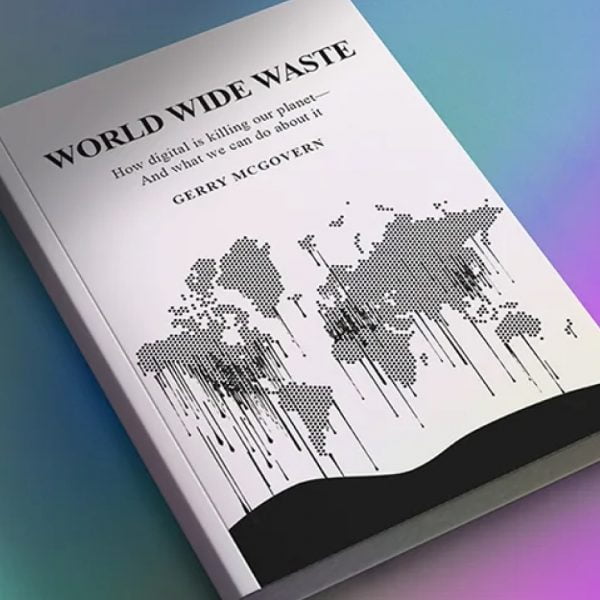
Gerry McGovern built his career on helping large organisations deliver a better digital customer experience. At the centre is a research method called Top Tasks, which he developed and refined over the course of 15 years. It focuses on identifying what matters most to customers and simplifying websites accordingly. Gerry discovered that if you removed around 80 to 90 percent of a site’s content, a company would sell more products, their support calls would drop, and customers would find what they were looking for faster. Recently, when reviewing his career, Gerry realised that his obsession with simplification could also benefit the environment, which led him to write World Wide Waste, a book about how digital is killing our planet and what we can do about it.
“Climate change had been on my mind for a while,” Gerry remembers. “Initially, I thought I was lucky because I was working in digital, and it’s green, right? But then it just struck me that everything in digital is electrical, and I began to think about all the work I’ve done in the last 25 years. Whenever I consult with an organisation, I’d find that 90 percent of either their content, data, or architecture would be waste. If you take sales management systems, for example, 49 out of 50 PowerPoint presentations are crap. They include the wrong pricing, or are just half done, and then I realised they all have to be stored. That’s just extraordinarily wasteful!”
Gerry started exploring how digital was affecting the climate, and found it to be the fastest growing user of energy and emitter of CO2. It was a real eye opener.
“Let’s look at just one specific area, the fashion industry,” Gerry suggests. “Our Instagram culture has accelerated fast fashion. We buy five times more clothes than 20 years ago, and we wear them for half as long. Most of them end up being dumped. Globally, the equivalent of an entire garbage truck full of textiles is dumped or burned every second, and because these clothes are increasingly made out of plastic, they’re toxic. We would need to plant 12 trillion trees to offset that sort of pollution, which happens to be four times more trees than currently exist on Earth. Digital doesn’t just consume energy, it also creates a culture of waste and impermanence.”
Gerry McGovern built his career on helping large organisations deliver a better digital customer experience. At the centre is a research method called Top Tasks, which he developed and refined over the course of 15 years. It focuses on identifying what matters most to customers and simplifying websites accordingly. Gerry discovered that if you removed around 80 to 90 percent of a site’s content, a company would sell more products, their support calls would drop, and customers would find what they were looking for faster. Recently, when reviewing his career, Gerry realised that his obsession with simplification could also benefit the environment, which led him to write World Wide Waste, a book about how digital is killing our planet and what we can do about it.
“Climate change had been on my mind for a while,” Gerry remembers. “Initially, I thought I was lucky because I was working in digital, and it’s green, right? But then it just struck me that everything in digital is electrical, and I began to think about all the work I’ve done in the last 25 years. Whenever I consult with an organisation, I’d find that 90 percent of either their content, data, or architecture would be waste. If you take sales management systems, for example, 49 out of 50 PowerPoint presentations are crap. They include the wrong pricing, or are just half done, and then I realised they all have to be stored. That’s just extraordinarily wasteful!”
Gerry started exploring how digital was affecting the climate, and found it to be the fastest growing user of energy and emitter of CO2. It was a real eye opener.
“Let’s look at just one specific area, the fashion industry,” Gerry suggests. “Our Instagram culture has accelerated fast fashion. We buy five times more clothes than 20 years ago, and we wear them for half as long. Most of them end up being dumped. Globally, the equivalent of an entire garbage truck full of textiles is dumped or burned every second, and because these clothes are increasingly made out of plastic, they’re toxic. We would need to plant 12 trillion trees to offset that sort of pollution, which happens to be four times more trees than currently exist on Earth. Digital doesn’t just consume energy, it also creates a culture of waste and impermanence.”

“Designing for the customer and user experience is definitely progress but we have to think beyond it because digital has created a culture of waste, overconsumption, and overconvenience.””Designing for the customer and user experience is definitely progress but we have to think beyond it because digital has created a culture of waste, overconsumption, and overconvenience.”
Greener design decisions
While a lot of companies are committed to renewable energy, we will also need to rethink our design and development decisions to really make a difference. Gerry points out that we have been blind to the hidden energy costs and wasteful habits of digital and has made it his mission to raise awareness, especially among digital professionals.
To accompany his book, he launched a podcast also called World Wide Waste (part of the Human Centered Design Network), in which he talks to designers who are pioneering green digital thinking and methods. The first episode featured Jeremy Keith, followed by Eric Meyer, Karen Peeters, Erika Hall, and more.



![How Much Does It Cost to Build AI Solutions In 2025 [Ultimate Guide]](https://crunch.is/wp-content/uploads/2024/06/steve-johnson-1FD-E7Ioblw-unsplash-scaled.jpg)



